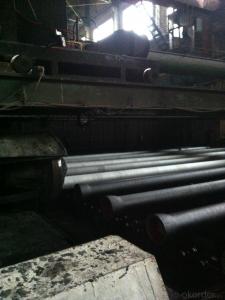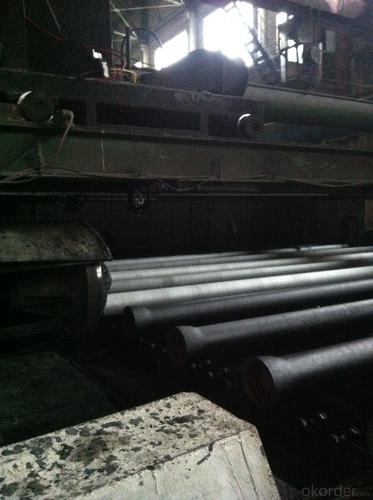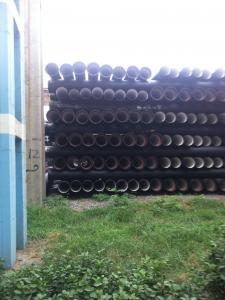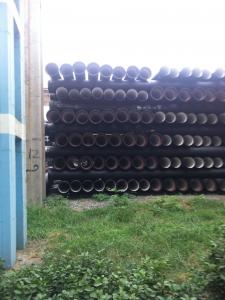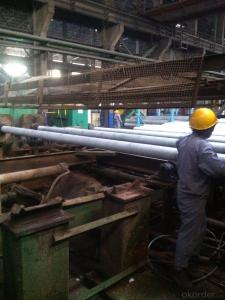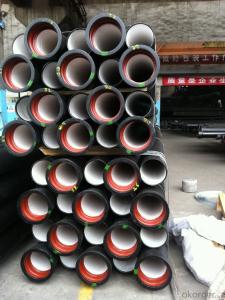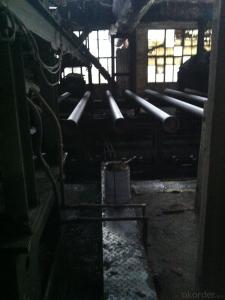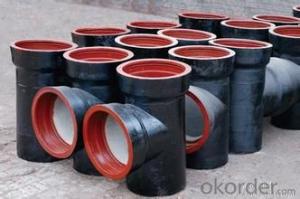DUCTILE IRON PIPE AND PIPE FITTINGS K9 CLASS DN300
- Loading Port:
- Tianjin
- Payment Terms:
- TT OR LC
- Min Order Qty:
- 20 pc
- Supply Capability:
- 3000 pc/month
OKorder Service Pledge
OKorder Financial Service
You Might Also Like
Material : Ductile Cast Iron
Size Range : DN 80mm to DN 2000mm
Unit Effective Length : 6m or 5.7m
Manufacture Standard: ISO 2531:1998/ EN 545:2006/EN 598:2007
Annual capacity : 200,000 tons
Coating Exterior: Zinc 130g/m2 according to ISO 8179-1 and bitumen coating 70 microns.
Cement Interior: Portland Cement/ High Alumina Cement/ Sulphate Resisting Cement Lining according to ISO 4179
Special requirements on external coating and internal lining can be applied
We also provide accessories such as SBR/EPDM rubber gaskets, lubricant paste, pipe caps, PE sleeves, etc.
Additional Parts:
Each pipe is strictly inspected according to related standard to ensure permanently high performance.
Easy Installation at site and service free for life
Long Service Lifespan
Quotation will arrive you within 24hours once we get your inquiry.
We guarantee offering you a competitive price.
A copy of original inspection reports of pipes will be offered after shipment.
Photos of loading process will be sent to the customer after shipment effect.
We will follow-up the delivery progress after shipment effect and update to the customer on weekly basis.
- Q: The difference between ductile iron pipe and UPVC drain pipe
- Centrifugal ductile iron pipe is ideal for urban water supply, gas pipelines, sets of high strength, good ductility and corrosion resistance advantages, performance with nature, iron and steel, is the replacement of the traditional cast iron pipe and common steel pipe renewal;
- Q: Are ductile iron pipes suitable for installation in areas with high groundwater salinity?
- Areas with high groundwater salinity are generally suitable for the installation of ductile iron pipes. Ductile iron is renowned for its resistance to corrosion, making it a favored choice for various applications, such as water and wastewater systems. High groundwater salinity refers to the increased presence of dissolved salts in the water. Although this can potentially cause corrosion in certain materials, ductile iron pipes are specifically engineered to withstand such conditions. These pipes are equipped with a protective lining, usually composed of cement mortar or polyurethane, which acts as a barrier between the pipe and its surroundings, including highly saline water. The lining serves to prevent any corrosive effects of the high groundwater salinity on the iron pipe, ensuring its long-lasting durability and reliability. Furthermore, ductile iron pipes possess a high tensile strength, enabling them to endure external loads and pressure, even in demanding environments. It is important to acknowledge that the suitability of ductile iron pipes for areas with high groundwater salinity can also be influenced by factors such as the specific levels of salinity, the presence of other corrosive agents, and the overall design and installation practices. Therefore, it is advisable to consult experts or engineers who are familiar with the local conditions in order to determine the most appropriate materials and precautions for specific installation projects.
- Q: What are the typical installation methods for ductile iron pipe?
- Proper installation and functionality of ductile iron pipe involve a series of steps. Firstly, the trench must be excavated to the required depth and width, considering the pipe diameter and bedding material. Careful preparation of the trench bottom is then necessary to remove sharp objects or debris that could damage the pipe. Next, an even layer of suitable bedding material, like sand or fine gravel, is placed along the trench bottom to support the pipe and prevent point loading. This bedding material is compacted to ensure stability and eliminate any voids that may cause pipe settling or shifting over time. Once the bedding is set, the ductile iron pipe is gently lowered into the trench, taking precautions to protect the pipe's coating. Regular intervals along the trench, appropriate pipe supports or blocks are used to align and support the pipes. After proper alignment, the joints are assembled by lubricating and inserting a rubber gasket into the bell end of the pipe. The spigot end of the adjacent pipe is then inserted into the bell end, creating a secure and watertight seal. With joints assembled, the backfilling process begins. Backfill material, typically a combination of native soil and select backfill, is carefully placed around the pipe in layers and compacted to ensure stability and prevent voids. Gradual backfilling allows for proper compaction without excessive pressure or pipe damage. Finally, the trench is fully backfilled and compacted to adequately support and protect the pipe from external forces. Surface restoration is then performed to minimize disruption caused by the installation process and restore the area to its original condition. It is important to note that installation methods may vary based on project specifications, local regulations, and engineering recommendations. Consulting the manufacturer's guidelines and working closely with qualified professionals is essential to ensure proper installation of ductile iron pipe.
- Q: What are the meanings of cast iron pipe wall thicknesses LA, A and B respectively?
- According to its manufacturing methods can be divided into: sand, centrifugal pipe, straight pipe, continuous cast iron pipe and sand pipe.According to the material used, it can be divided into gray iron pipe, nodular cast iron pipe and high silicon iron pipe.1 、 water supply cast iron pipe:The use of cast iron cast iron water pipe of No. 18 above by adding nodulizer, after centrifugal ductile cast iron pipe by centrifugal casting machine, the performance of ductile iron pipe with nature, iron and steel, excellent corrosion resistance, good ductility, good sealing effect, simple installation, mainly for municipal, industrial and mining enterprises water, gas, oil etc.. Water supply pipe is the first choice, with high cost performance.2 、 sand casting centrifugal cast iron pipe:The sand casting centrifugal cast iron pipe is made of gray cast iron. It is suitable for the transportation of pressure water such as water and gas.
- Q: Can ductile iron pipes be used for bridge drainage systems?
- Yes, ductile iron pipes can be used for bridge drainage systems. Ductile iron pipes are known for their strength, durability, and resistance to corrosion, making them suitable for various applications, including bridge drainage systems. They can effectively handle the flow of water and withstand the weight and pressure of vehicles passing over the bridge.
- Q: What is the average diameter range of ductile iron pipes?
- The diameter of ductile iron pipes can vary depending on the application and industry standards. In general, there is a wide range of diameters available to meet different requirements. Ductile iron pipes can start from as small as 4 inches (100 mm) and go up to 64 inches (1600 mm) or even larger. These sizes are commonly used for water distribution, sewer systems, and infrastructure projects. It is important to consider factors such as local regulations, project specifications, and engineering considerations when determining the appropriate diameter range. Consult industry standards and relevant authorities for specific applications.
- Q: What is the expected deflection of ductile iron pipes under load?
- The expected deflection of ductile iron pipes under load can vary depending on several factors such as the diameter, wall thickness, material properties, and the magnitude and distribution of the load applied. Generally, ductile iron pipes have a relatively high resistance to deflection due to their inherent strength and durability. They are designed to withstand substantial loads and are often used in applications where high pressure and heavy loads are expected. To determine the expected deflection, engineers typically use structural analysis techniques such as finite element analysis or beam theory calculations. These methods take into account the specific geometry and material properties of the ductile iron pipe to predict its behavior under load. In practice, ductile iron pipes are designed with a certain maximum allowable deflection, which is usually specified by industry standards or local regulations. This maximum allowable deflection ensures that the pipe remains structurally sound and maintains its functionality. It is important to note that the expected deflection of ductile iron pipes can also be influenced by external factors such as soil conditions, installation methods, and changes in temperature. Therefore, proper installation techniques and adherence to industry guidelines are crucial to ensure the pipes perform as expected and meet the required deflection limits.
- Q: What is the expected deflection limit of ductile iron pipes?
- The expected deflection limit of ductile iron pipes is typically around 2% of the pipe's diameter, as per industry standards.
- Q: How can the steel plastic composite pipe be connected with the cast iron pipe?
- The clamp hoop is a connecting device for connecting pipe fittings, valves and pipe fittings with grooves. Used in the fast joint between the role of tightening, the general two joints with gaskets, rubber, and silicone, ptfe.
- Q: How do ductile iron pipes perform in high-temperature steam applications?
- Ductile iron pipes are known for their exceptional performance in high-temperature steam applications. They have the ability to withstand elevated temperatures and maintain their structural integrity, making them highly suitable for use in steam distribution systems. One key advantage of ductile iron pipes in high-temperature steam applications is their excellent thermal conductivity. This property allows for efficient heat transfer, ensuring that the steam is delivered at the desired temperature without significant loss. The high thermal conductivity of ductile iron also helps to minimize the risk of thermal expansion and contraction, which can lead to pipe failure or leakage. Furthermore, ductile iron pipes have a high melting point, typically around 2000°F (1093°C), which makes them resistant to the extreme temperatures encountered in steam applications. This ability to withstand high temperatures without deformation or structural failure ensures the reliability and longevity of the piping system. Another important factor contributing to the performance of ductile iron pipes in high-temperature steam applications is their corrosion resistance. These pipes are typically coated with epoxy or other protective materials to prevent corrosion and maintain their structural integrity even in aggressive steam environments. This corrosion resistance helps to ensure that the pipes can withstand the harsh conditions and operate efficiently over an extended period. In summary, ductile iron pipes are well-suited for high-temperature steam applications due to their excellent thermal conductivity, high melting point, and corrosion resistance. These properties make them a reliable and durable choice for steam distribution systems, ensuring the safe and efficient transport of steam at elevated temperatures.
Send your message to us
DUCTILE IRON PIPE AND PIPE FITTINGS K9 CLASS DN300
- Loading Port:
- Tianjin
- Payment Terms:
- TT OR LC
- Min Order Qty:
- 20 pc
- Supply Capability:
- 3000 pc/month
OKorder Service Pledge
OKorder Financial Service
Similar products
Hot products
Hot Searches
Related keywords
